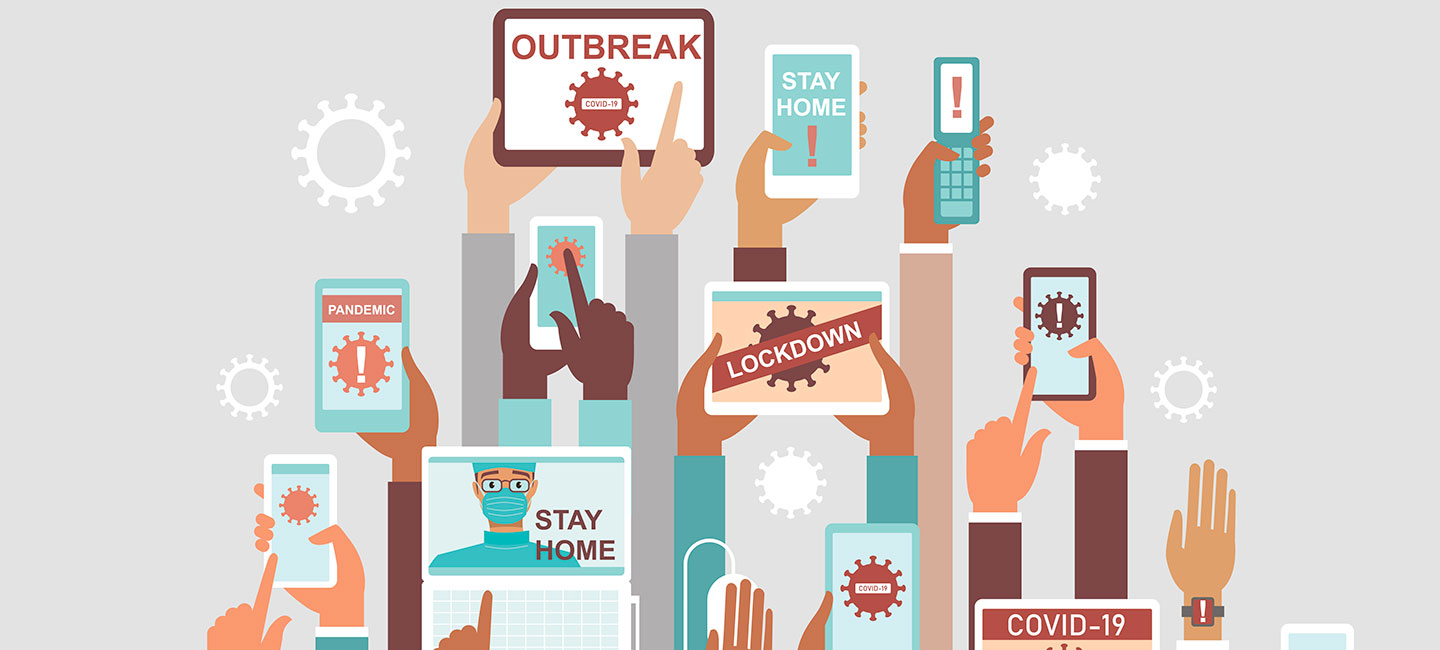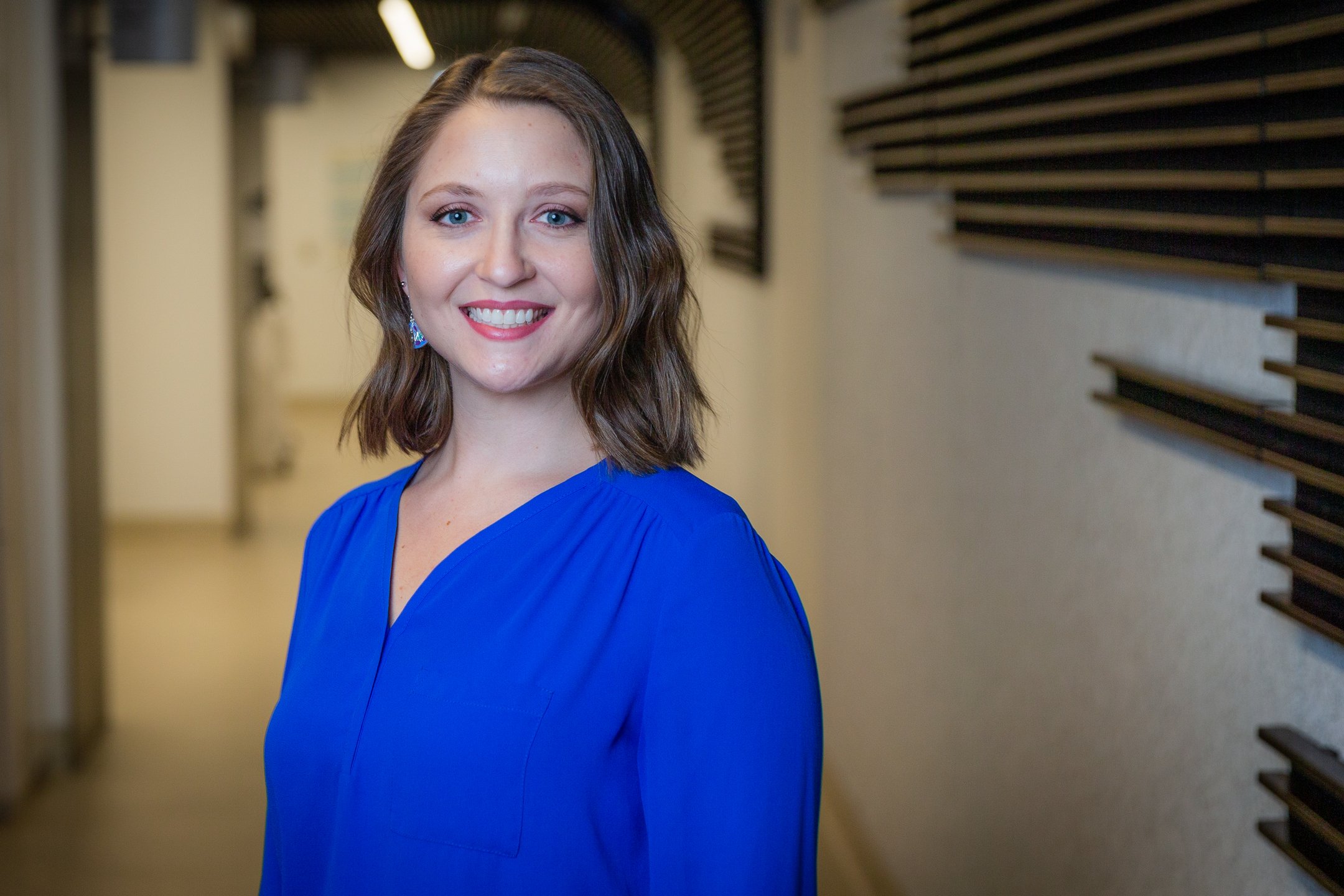COVID-19 Facts and Fears
The COVID-19 pandemic has changed the way we live and will continue to do so for some time. But while some things are slowly getting back to normal, like school and business openings, questions and fear remain regarding the virus, especially among those who are immunocompromised and more susceptible to COVID-19. Moffitt Cancer Center’s Patient and Family Advisory Council organized a webinar with Moffitt experts and patients to help clear up fact from fiction when it comes to COVID-19. More than 500 people participated.
Here are the top six takeaways:
1. Moffitt is the Safest Place for Your Treatment
Jack Kolosky, hospital president and chief operating officer, spoke about the impact of COVID-19 at Moffitt. Even as positivity rates soared throughout the Tampa Bay area this summer, Moffitt has seen fewer than 70 positive patient cases, with virtually every case being tied to community spread. Kolosky said that many of these positive cases were identified through Moffitt’s pre-procedural onsite testing.
While the cancer center has been following strict protocols to protect the safety of its patients and staff, Kolosky also praised Moffitt’s patients for being vigilant in combating the spread of COVID-19. “Cancer patients are the most cautious, careful people we know in terms of social distancing, wearing masks and doing things that are important in fighting this disease,” said Kolosky.
2. What to Expect at Your Appointment
Patient safety is Moffitt’s top priority. Chief Nursing Officer Jane Fusilero, RN, reviewed Moffitt’s current safety measures to protect the most vulnerable in our community.
- Arriving at Moffitt:
- Valet and self-parking available.
- Valet will wipe down your car interior upon request.
- All patients and visitors are asked to sanitize their hands upon arrival.
- COVID-19 screenings at entrances:
- All patients and approved visitors are screened for symptoms upon entry into the building.
- You will receive a mask and sticker after you have been screened.
- Masks, sanitation, social distancing and other safety measures:
- Moffitt will provide patients and approved visitors with a mask. Cloth masks are also acceptable.
- Follow seats and floor markers to keep a safe distance from others.
- Elevator capacity is limited to four people.
- Hand sanitation stations are setup throughout Moffitt.
- High-touch surfaces are being cleaned frequently.
-
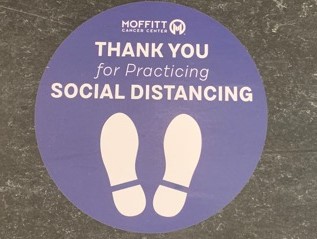
Visitors can follow floor markers to practice social distancing.
3. Caregivers and Visitors
Moffitt understands that caregivers are an important part of the care team. We continually monitor the spread of COVID-19 in our community to determine adjustments to the visitor policy. At this time, only patients are allowed on campus for clinic and outpatient appointments, with limited exceptions. At the beginning of September, Moffitt modified its visitor policy to allow one visitor for patients admitted to the hospital, undergoing surgery or having a procedure.
The latest visitor policy information is available here.
Here are a few important reminders while visitation is limited:
- Loved ones can stay in touch and join appointments using smartphones and Zoom. Moffitt can arrange for these services during an appointment or hospital stay.
- Patients with mobility issues can request a wheelchair from the valet. Transport assistance is available to help patients navigate the cancer center.
- Caregivers who have significantly long wait times and need help making arrangements may call Patient Relations at 813-745-3808 to discuss options
4. The Latest Science on COVID-19
Dr. John Greene, chair of Moffitt’s Infectious Diseases Program, joined the call to discuss the latest science behind COVID-19 and to clear up any myths about the virus. Greene said that Moffitt’s number of positive cases is remarkably ten times lower compared to other hospitals in the greater Tampa Bay area. He attributed this difference to the care and precautions cancer patients and their families take to protect themselves against the virus.
“The safest place you can be is in the hospital because of the strict testing, social distancing, cleanliness and handwashing,” said Greene while reviewing the likelihood of being infected with COVID-19. He emphasized that wearing masks and social distancing are effective in protecting against the virus. In terms of exposure, he said that being within six feet of an infected family member without a mask represents the greatest risk of infection.
A recent study published in JAMA revealed that hospitals may be the safest spaces during this pandemic. Testing over 128 samples from high-touch surfaces of a New Jersey oncology unit found no traces of coronavirus, suggesting that the strict cleaning and disinfecting protocols helped to limit the virus’ spread.
Here are some facts and figures to keep in mind:
- Moffitt’s number of patients that have tested positive is ten times lower than other Tampa Bay hospitals.
- Moffitt has performed over 10,000 COVID-19 tests onsite – allowing patients to be cleared before procedures and to give staff access to reliable, timely results.
- The greatest risk of infection is through a symptomatic family member.
- Risk of transmission is highest when it occurs within 6 ft. for longer than 15 minutes and without a mask.
- Someone people may test positive for several weeks following a COVID-19 infection, but a person is rarely contagious beyond 20 days.
- While wearing gloves can protect you, frequent handwashing is more effective.
- The most effective masks are N-95s but surgical or two-layer cotton fabric masks are also effective at minimizing the spread of infection.
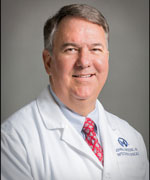
5. What Cancer Patients Should Know
“Cancer does not wait for COVID-19,” said Dr. Bob Keenan, Moffitt’s chief medical officer and vice president of Quality as he stressed the importance of screenings and urged patients to keep their appointments. “We’re already seeing evidence that potentially 10,000 excess deaths might occur due to breast cancer or colon cancer over the next decade because the disease was not picked up as early as it could’ve been if people were getting their screenings during the COVID-19 pandemic.”
Emphasizing that Moffitt is a safe place to visit for screenings and preventive cancer care, Keenan says that, “Coronavirus is something that we know how to deal with.” Patients should feel safe visiting due to Moffitt’s extensive testing and cleaning procedures. While Moffitt has had positive patients, the vast majority have recovered and gone home. “Globally, the medical community has learned a lot more about detection and treating the virus,” said Keenan.
- Do not delay treatment or screenings
- Consider a Virtual Visit when available
- Follow guidance from your health care team
- Call the Patient Care Hotline at 813-745-8000 if you have concerns about upcoming appointments
6. Patient & Caregiver Perspectives
Three special guests also joined the webinar to offer a variety of relatable perspectives for patients and caregivers. Shani Parkin, co-chair of Moffitt’s Patient and Family Advisory Council, spoke on the effects of the coronavirus pandemic on the cancer population. “The COVID-19 pandemic has been difficult for everyone, even more so for those of us who are cancer survivors, patients currently in treatment, and those caring for someone with cancer,” said Parkin. “As we all know, cancer doesn’t stop for a pandemic.”
Patti Halula, another Moffitt patient and co-chair of the Patient and Family Advisory Council, shared her story of visiting the center during the pandemic. “I was on my way to Moffitt and I noticed that I was having a physical reaction due to the anxiety,” said Halula. “Once I went through those doors, I wanted to run a sprint to get through the hospital, get through my appointments and get back to my car where I felt safe.” Halula considered stopping her treatment and canceling her appointments.
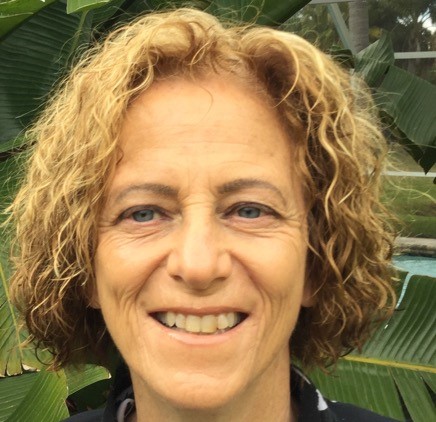
After observing the changes and safety protocols that Moffitt created in response to COVID-19, Halula said, “Not only was the compassion and concern for my wellbeing still front and center, it was even more heightened.” Halula encourages other patients to seek out Moffitt’s support groups offered by the Patient and Family Advisory Program, like the metastatic support group she attends once a month.
Laura Barber, Moffitt patient, caregiver and volunteer, stressed self-care during this pandemic. A breast cancer survivor of seventeen years, Barber became her husband’s caregiver ten years ago when he began his own cancer journey. Although her husband is past his most urgent stages of treatment, Laura still attends follow up appointments with him. “Through my own cancer journey and through his, we’ve been a team. We always go together to appointments. We’re the first person the other sees coming out of surgery. COVID really messed up our whole routine,” said Barber. “Cancer is enough to be anxious about.”
When her husband became a Moffitt patient, Barber was told to practice self-care as a caregiver, but she didn’t heed the warnings. Asking other caregivers to learn from her mistake, Barber encourages others to find their special ways of finding joy whether it’s through physical activity or mindfulness. “Please learn from my mistake, it’s very important for the patient and the caregiver. Self-care looks different for everyone.”
She also emphasized the effectiveness of virtual visits for caregivers. In two weeks, she’ll be using video conferencing to connect with her husband during his appointment. She was hesitant about this at first but says that Moffitt’s Patient Relations team has helped reassure her.
“If you’re new in your cancer journey, you are in a very special place,” said Barber. “All of the campuses are pristine, the team members are professional and very compassionate, it’s safe… Moffitt is a place like no other. So, please know that you’re in the best possible place.”


